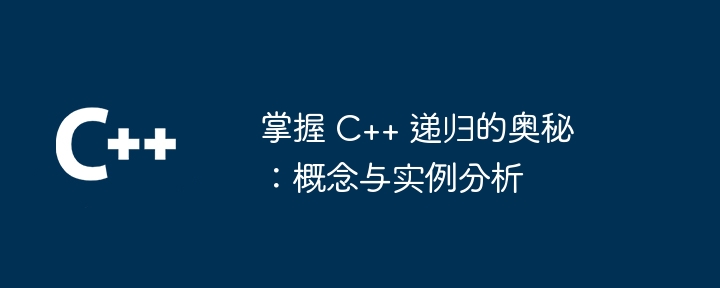
Answer: C Recursion is a powerful technique for a function to call itself. Detailed description: Recursive functions break the problem into smaller sub-problems. The function calls itself recursively to solve the subproblem until the subproblem is small enough. Common recursive practical cases include: factorial calculation, Fibonacci sequence, Hanoi's Tower, quick sort and depth-first search. The advantage of recursion is that it is simple and easy to understand and can solve complex problems efficiently. The disadvantages are that the call stack can overflow, large inputs can cause performance degradation, and debugging can be challenging.

Master the secrets of C recursion: Concept and example analysis
Introduction
Recursion is a powerful technique in computer science that allows a function to solve a problem by calling itself. In C, recursion can provide concise and efficient solutions in many situations. This article will delve into the concept of C recursion and provide practical examples to help you master this valuable skill.
The concept of recursion
The basic idea of the recursive function is to decompose the problem into smaller and simpler sub-problems than the original problem. The function then calls itself recursively to solve each subproblem until the subproblem is simple enough to be solved in other ways.
In C, you can call a function recursively using the keyword return:
int factorial(int n) {
if (n == 0) {
return 1;
} else {
return n * factorial(n - 1);
}
}This function computes the factorial of a specified integer.
Practical cases
The following are some common recursive practical cases:
Pros and Cons
Pros:
Disadvantages:
conclusión
Recursion is a powerful tool in C that can help solve complex problems. By understanding the concept of recursion and studying practical examples, you can master this technique and improve your programming skills.
The above is the detailed content of Master the secrets of C++ recursion: Concept and example analysis. For more information, please follow other related articles on the PHP Chinese website!
 What are the differences between c++ and c language
What are the differences between c++ and c language
 Recommended learning order for c++ and python
Recommended learning order for c++ and python
 Cost-effectiveness analysis of learning python and c++
Cost-effectiveness analysis of learning python and c++
 Is c language the same as c++?
Is c language the same as c++?
 Which is better to learn first, c language or c++?
Which is better to learn first, c language or c++?
 The difference and connection between c language and c++
The difference and connection between c language and c++
 C++ software Chinese change tutorial
C++ software Chinese change tutorial
 Cost-effectiveness analysis of learning python, java and c++
Cost-effectiveness analysis of learning python, java and c++




